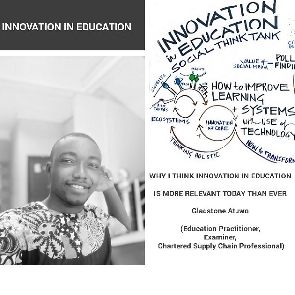Opinions of Wednesday, 8 March 2023
Columnist: Gladstone Atuwo
Why I think innovation in education is more relevant today than ever
As you're aware, innovation in public education has become a highly contentious issue. But, in talking to a seasoned educationist (Head of School) offering international curricula developed on participatory and connective teaching methods aimed at the creativity of the learner, one quickly gets the impression that education systems in the public school domain, in general, are very reluctant to innovate, and that there is strong resistance to change among teachers and other actors.
Well, this is because education is sometimes perceived as one of the most conservative social systems and public policy fields. But my regular interaction with teachers in the Ghana Education Service gives me the opposite idea; that there are too many changes imposed on them without much consultation or the necessary preconditions for successfully implementing change. A case in mind is the distribution of one teacher, one laptop initiative by the Government of Ghana to infuse technology drive in the delivery of education.
You'd agree with me that technology-based innovations in education have become necessary to reshape the environments in which schools Operate.
In general, they tend to open up learning environments, both to the digital world and the physical and social environment.
They also bring new actors and stakeholders into the educational system, not least the education industries, with their ideas, views, and dreams about what the future of education can hold. Despite fears of “marketization”, the education industry could be an essential partner in any education innovation strategy.
Instead of being considered just as providers of goods and services, different relationships between schools and industry could foster an innovation-friendly environment, with a greater focus on methods over technologies.
In my opinion, the understanding of the education industries better, including their market structures and innovation processes, would help to create a more mature relationship with the education sector.
Moreover, innovation in the industry which develops the products and services that could drive innovation in schools does not happen in isolation from what is happening in the education sector.
Only when there is an innovation-friendly culture in education systems, supported by an innovation-friendly business environment and policies, will industries start to engage in risk-intensive research and development? Governments can support this by fostering a climate of entrepreneurship and innovation in education.
Although they cannot transform education by themselves, digital technologies do have huge potential to transform teaching and learning practices in schools and open up new horizons.
Indeed, the challenge of achieving this transformation is more about integrating new types of instruction than overcoming technological barriers.
It is now imperative to infuse digital technology to facilitate the following:
Innovative pedagogic models such as the ASSURE model that focuses on identifying the learning styles of learners (Visual, Audio, Kinesthetic) by integrating web quest webpage, Arts & Crafts, gaming, online laboratories, and real-time assessment, which have been shown to improve higher-order thinking skills and conceptual understanding and in many cases have enhanced students’ creativity, imagination and problem-solving skills.
Simulations such as remote or virtual online laboratories, provide relatively low-cost flexible access to experiential learning.
International collaborations, overcoming barriers of geography and formal classroom hours. These give students insight into other cultures and experience multicultural communication, and closely emulate the collaborative nature of today’s professional environments.
Real-time formative assessment and skills-based assessment tools like SOCRATIVE, GOOGLE CLASSROOM, and MOODLECLOUD in allowing teachers to monitor student learning as it happens and adjust their teaching accordingly. It may also enable the active participation of more students in classroom discussions.
The technology-supported assessment also enables skill development to be monitored in a more comprehensive approach.
E-learning, open educational resources, and massive open online courses, mainly aimed at autonomous learners.
I remain convinced that only educational innovations that customize and personalised the educational process can improve learning outcomes and the quality of education provision.













